Effective construction project management tools are essential for successful project execution, offering advanced scheduling capabilities, resource management, and compliance tracking. These tools streamline timelines and resource allocation while ensuring adherence to legal and safety standards, ultimately enhancing project efficiency and effectiveness. By leveraging such platforms, project managers can optimize labor, materials, and equipment usage, leading to smoother project delivery.
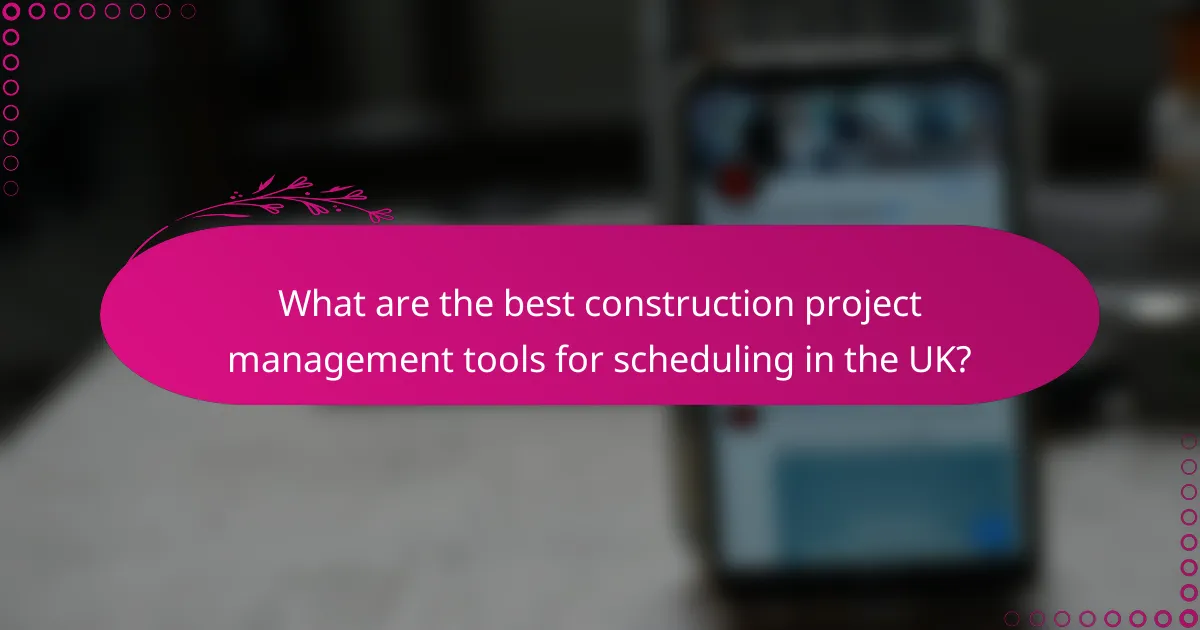
What are the best construction project management tools for scheduling in the UK?
The best construction project management tools for scheduling in the UK include Procore, PlanGrid, and Buildertrend. These platforms offer robust scheduling capabilities that help teams manage timelines, allocate resources, and ensure compliance throughout the project lifecycle.
Procore scheduling capabilities
Procore provides comprehensive scheduling features that integrate seamlessly with its project management tools. Users can create and manage schedules using Gantt charts, which allow for easy visualization of project timelines and dependencies.
Additionally, Procore supports collaboration by enabling team members to update tasks in real-time, ensuring everyone is aligned on project progress. This tool is particularly beneficial for larger projects where multiple stakeholders are involved.
PlanGrid scheduling features
PlanGrid focuses on mobile accessibility, allowing users to manage schedules directly from their devices. Its scheduling features include task assignments and deadline tracking, making it easy for teams to stay on top of their responsibilities.
One notable aspect of PlanGrid is its integration with construction drawings, which helps teams visualize how scheduling impacts the physical work on-site. This can enhance communication and reduce misunderstandings among team members.
Buildertrend scheduling tools
Buildertrend offers user-friendly scheduling tools that cater to both residential and commercial construction projects. Its drag-and-drop interface simplifies the process of creating and adjusting schedules, making it accessible for users with varying levels of technical expertise.
Moreover, Buildertrend includes features for tracking project milestones and deadlines, which helps ensure that projects stay on schedule. The platform also allows for client access, enabling homeowners to view progress and timelines, fostering transparency and trust.
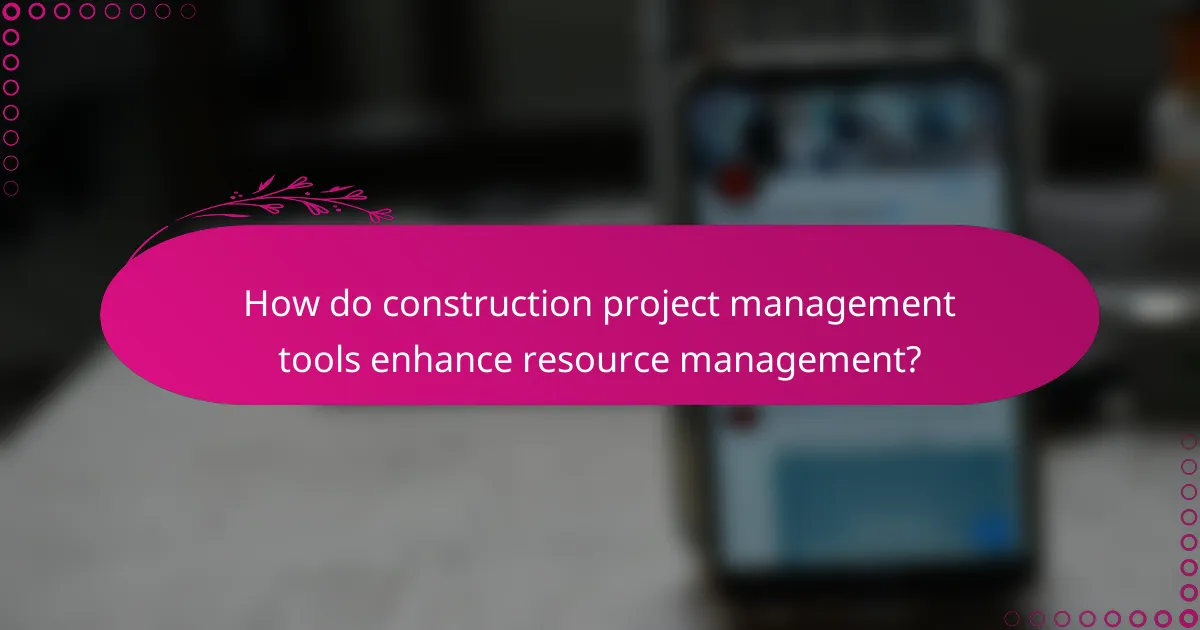
How do construction project management tools enhance resource management?
Construction project management tools significantly improve resource management by providing features that streamline allocation, tracking, and compliance. These tools help project managers optimize the use of labor, materials, and equipment, ensuring that resources are utilized efficiently and effectively throughout the project lifecycle.
Resource allocation in CoConstruct
CoConstruct offers robust resource allocation capabilities that allow project managers to assign tasks and resources based on availability and project needs. Users can create schedules that reflect the current workload and adjust allocations in real-time to accommodate changes or delays.
One key feature is the ability to visualize resource availability through a calendar view, making it easier to identify potential bottlenecks. For example, if a subcontractor is overbooked, the tool can suggest alternative resources or timelines to maintain project flow.
Resource tracking in Smartsheet
Smartsheet excels in resource tracking by providing real-time updates on resource usage and performance metrics. This allows project managers to monitor how resources are being utilized against the planned budget and timeline, helping to identify inefficiencies early on.
With features like automated alerts and dashboards, users can quickly assess whether resources are being over or under-utilized. For instance, if labor hours exceed estimates, project managers can take corrective actions to mitigate cost overruns and ensure project deadlines are met.
![]()
What are the compliance tracking features in construction project management tools?
Compliance tracking features in construction project management tools help ensure that projects adhere to legal, safety, and quality standards. These tools typically offer functionalities for monitoring regulations, managing documentation, and facilitating audits to maintain compliance throughout the project lifecycle.
Compliance tracking in Viewpoint Vista
Viewpoint Vista provides robust compliance tracking capabilities that allow project managers to monitor adherence to regulations and contract requirements. The platform includes features for tracking certifications, licenses, and insurance documentation, ensuring that all subcontractors and vendors meet necessary legal standards.
Users can set up automated alerts for upcoming compliance deadlines, which helps prevent lapses in documentation. Additionally, the software offers reporting tools that simplify the audit process, allowing for quick access to compliance records and status updates.
Compliance management in e-Builder
e-Builder focuses on compliance management by integrating compliance tracking into its project management workflows. The tool allows users to create compliance checklists tailored to specific projects, ensuring that all necessary steps are followed throughout the construction process.
e-Builder also features a centralized document repository where users can store and manage compliance-related documents, such as safety plans and inspection reports. This centralization enhances collaboration among team members and simplifies the retrieval of information during audits or inspections.
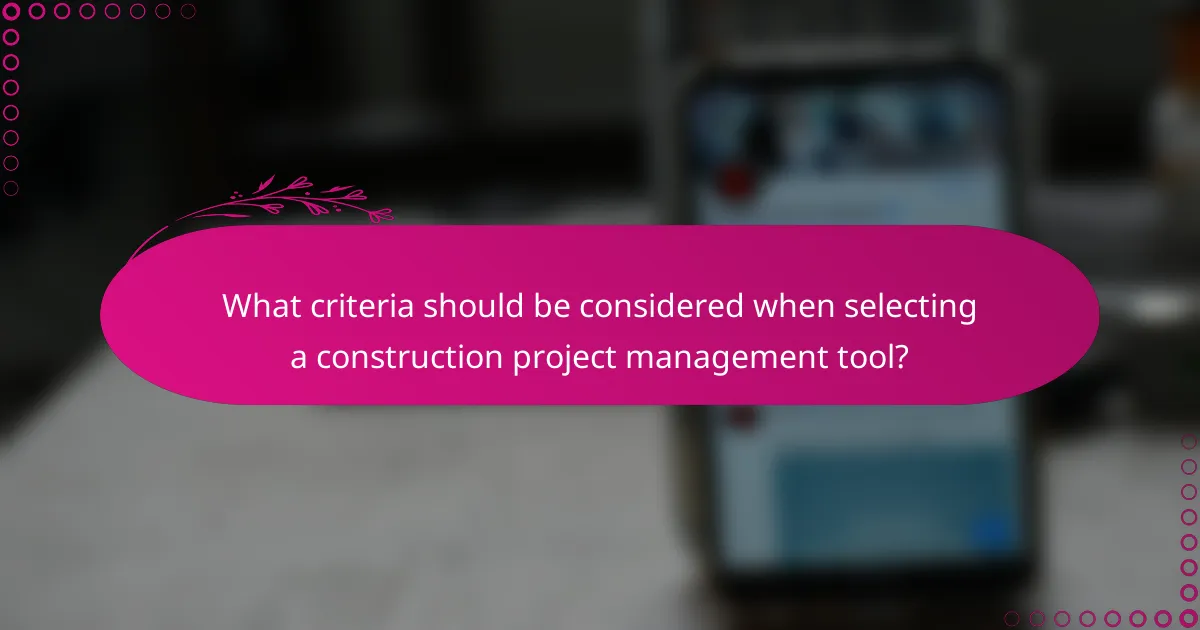
What criteria should be considered when selecting a construction project management tool?
When selecting a construction project management tool, consider its scheduling capabilities, resource management features, and compliance tracking functionalities. These criteria ensure that the tool effectively supports project timelines, optimizes resource allocation, and adheres to relevant regulations.
Integration capabilities
Integration capabilities are crucial for a construction project management tool, as they determine how well the software can work with other systems. Look for tools that easily connect with accounting software, scheduling applications, and communication platforms to streamline workflows. A well-integrated tool can save time and reduce errors by automating data transfer between systems.
For example, a tool that integrates with popular accounting software can automatically update financial records based on project expenses, ensuring real-time budget tracking. Aim for tools that support APIs or have pre-built integrations with commonly used applications in the construction industry.
User interface and experience
A user-friendly interface is essential for ensuring that all team members can effectively use the construction project management tool. The design should be intuitive, allowing users to navigate easily and access key features without extensive training. Consider tools that offer customizable dashboards to display relevant information at a glance.
Additionally, prioritize tools that provide mobile access, enabling on-site teams to update project statuses and communicate in real time. A good user experience can significantly enhance team productivity and reduce the learning curve associated with new software.
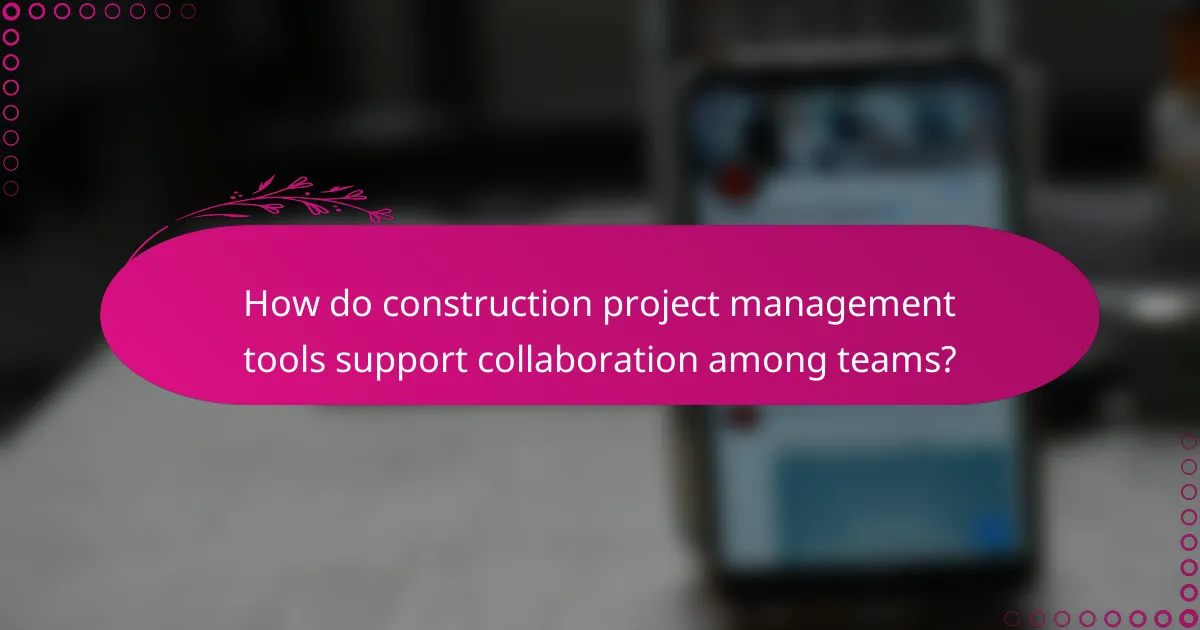
How do construction project management tools support collaboration among teams?
Construction project management tools enhance collaboration by providing centralized platforms where teams can communicate, share documents, and track progress in real-time. These tools streamline workflows and ensure that all team members are aligned with project goals and updates.
Collaboration features in Monday.com
Monday.com offers a variety of collaboration features that facilitate teamwork on construction projects. Users can create boards to visualize tasks, assign responsibilities, and set deadlines, ensuring everyone knows their roles. The platform supports file sharing and comments directly on tasks, allowing for immediate feedback and discussion.
Additionally, Monday.com allows integration with other tools, such as Slack and Google Drive, which can enhance communication and document management. Teams can customize notifications to stay informed about project changes, helping to maintain momentum and accountability.
Communication tools in Trello
Trello provides a user-friendly interface for communication among construction teams through its card-based system. Each card can represent a task or project component, and team members can add comments, attachments, and checklists to keep everyone updated on progress. This visual approach helps teams quickly identify what needs attention.
Moreover, Trello’s integration with tools like Power-Ups allows for enhanced functionality, such as calendar views and automation. Teams can set due dates and reminders to ensure timely completion of tasks, which is crucial in the fast-paced construction environment.
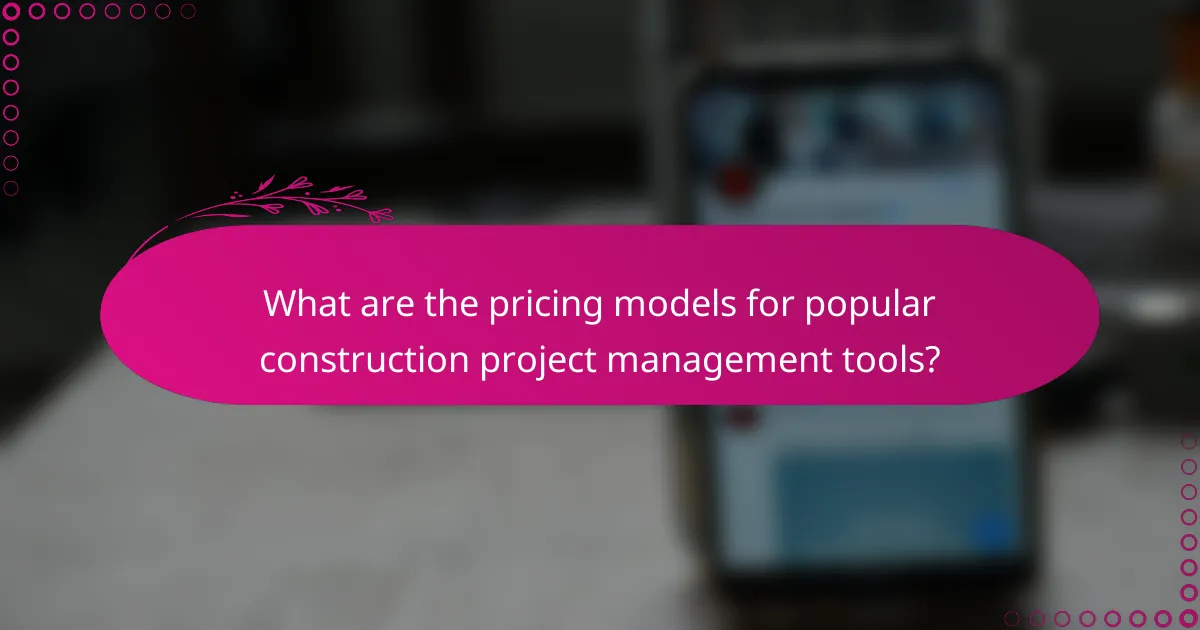
What are the pricing models for popular construction project management tools?
Popular construction project management tools typically offer subscription-based pricing models, which may vary based on features, user count, or project size. Understanding these pricing structures is crucial for selecting the right tool that fits your budget and project needs.
Procore pricing plans
Procore offers tiered pricing plans that cater to different project sizes and complexities. Generally, pricing is based on the number of users and the specific features selected, with costs typically ranging from several hundred to a few thousand dollars per month.
Key features included in Procore’s plans often cover project management, financials, and quality and safety modules. Prospective users should consider their specific requirements and compare the available features to ensure they choose the most suitable plan.
Buildertrend subscription options
Buildertrend provides flexible subscription options, including a monthly plan and an annual plan, which can lead to cost savings. Pricing generally starts at around $99 per month for basic features, with higher tiers available for more advanced functionalities.
Buildertrend’s plans typically include tools for scheduling, budgeting, and customer management. Users should evaluate their project needs and the number of users to determine the best subscription option that aligns with their budget and operational requirements.
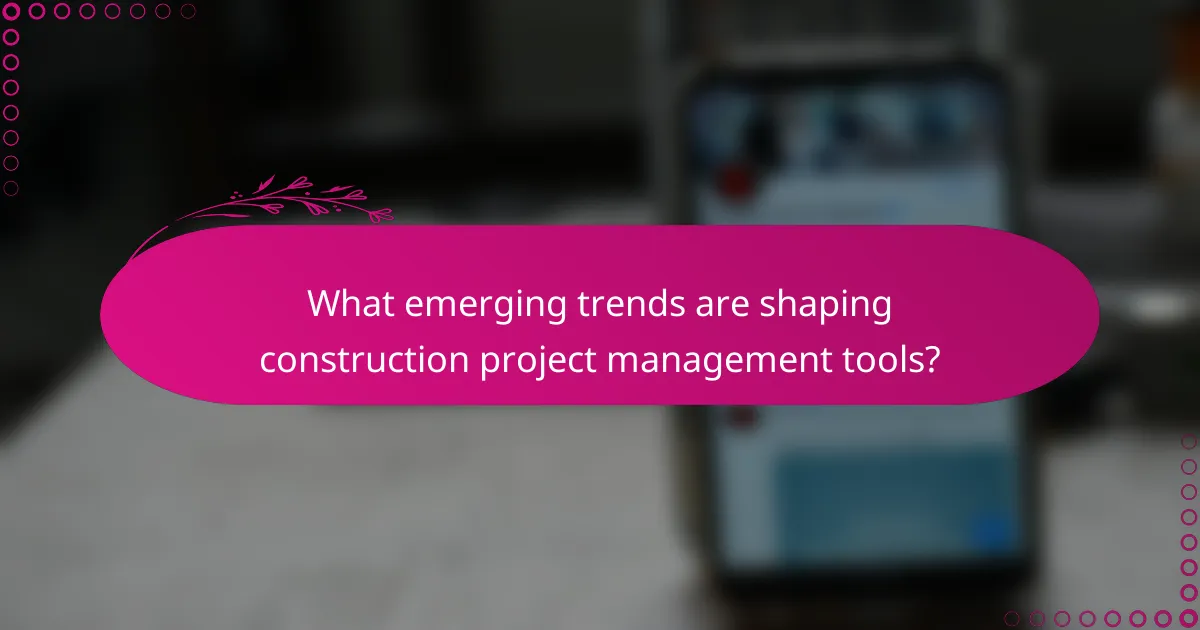
What emerging trends are shaping construction project management tools?
Emerging trends in construction project management tools are increasingly focused on enhancing scheduling capabilities, optimizing resource management, and improving compliance tracking. These advancements are driven by the need for greater efficiency, better collaboration, and adherence to regulatory standards.
Scheduling capabilities
Modern construction project management tools are integrating advanced scheduling capabilities that allow for real-time updates and adjustments. Features like Gantt charts, critical path analysis, and automated alerts help teams stay on track and manage timelines effectively.
Consider tools that offer mobile access, enabling on-site teams to update schedules instantly. This can reduce delays and miscommunication, ensuring that all stakeholders are informed of changes as they happen.
Resource management
Resource management in construction project management tools is evolving to include sophisticated tracking of labor, materials, and equipment. These tools often feature dashboards that provide insights into resource allocation and utilization, helping project managers make informed decisions.
Utilizing software that allows for forecasting and scenario planning can help anticipate resource needs and avoid shortages. Look for tools that offer integration with procurement systems to streamline ordering and inventory management.
Compliance tracking
Compliance tracking is becoming a critical feature in construction project management tools, ensuring that projects adhere to local regulations and safety standards. Tools now often include checklists, documentation storage, and automated reporting to simplify compliance processes.
To enhance compliance, choose tools that provide templates for regulatory documentation and allow for easy updates as regulations change. Regular audits and reviews within the software can help maintain adherence and mitigate risks associated with non-compliance.